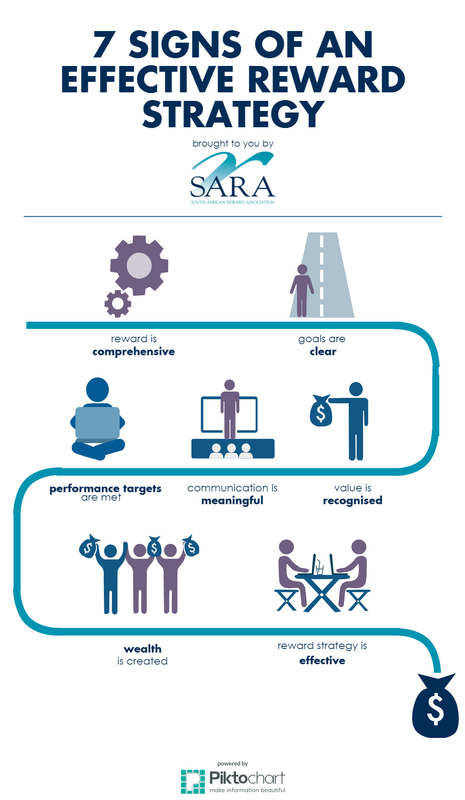Ditch the rigid, bureaucratic, one size fits all business model - its time has come. The organisation is facing challenging times. Budgets must be closely watched, performance measured and results driven. However, the people that make up the lifeblood of the business must still be nurtured and rewarded, given credit and recognition for the work that they do and inspired to loyalty.
“For a business to thrive it needs the engagement and commitment of its employees,” says Dr Mark Bussin, Exco member of the South African Reward Association (SARA). “This can be found in a well-structured reward strategy.” These rewards are the financial and non-financial returns given to employees in exchange for their time, talents, efforts and results. Dr Bussin shares seven signs that prove the organisation is doing their job here well. The reward is comprehensive Total Rewards describes the strategy of blending money, benefits, work/life, performance and recognition, development and career opportunities into one complete package. This type of solution is far more likely to attract talent alongside motivating and retaining it. The goals are clear A well-designed Total Reward plan provides an integrated approach for reward management, aligns reward practices with the business strategy and adheres to legal, ethical and best practice standards. Performance targets are met “If the organisation is meeting fundamental financial performance targets and providing superior total return to shareholders, then you know your reward strategy is working. The total reward strategy underpins the business strategy and supports achievement of the targeted financial returns,” says Dr. Bussin. Communication is meaningful An excellent reward strategy is an art, and if the CEO, board, investors and analysts communicate in a meaningful way and the reward system encourages the CEO to align with the shareholders and vice versa, then it is on track to success. Value is recognised “A well-implemented solution will see that the board has sufficient understanding of the total reward strategy to know where to look for answers and approach experts,” says Dr. Bussin. “The board uses its resources and taps into the experiences and wisdom of a diverse range of directors. In addition, the board acts cohesively and as a collective, not breaking down into factions. A great reward system encourages team behaviour.” Wealth creation Through a well-managed and crafted reward strategy, the CEO and the long term investors are creating substantial levels of wealth. The reward system is focused on the long term sustainability of the organisation and producing superior returns over a long period of time. It is effective An effective reward strategy is based on sound principles and practices, is reliant on the achievement of desired outcomes, is positive and meaningful and impacts behaviour in the right ways. If it works, the talent pipeline will be packed with CEO candidates as the organisation has a reward system that has clear succession planning and there are no surprises. “A good reward system allows the employee to know well in advance how they are doing and if they will earn, say, a bonus,” concludes Bussin. “It rewards succession planning and penalises job preservation by holding onto information.” ENDS MEDIA CONTACT: Cathlen Fourie, 012 644 2833, [email protected], www.atthatpoint.co.za For more information on SARA please visit: Website: www.sara.co.za Twitter: @SA_reward LinkedIn: South African Reward Association Facebook: SARA – South African Reward Association
0 Comments
Leave a Reply. |
Archives
March 2023
Welcome to the South African Reward Association newsroom.
Categories
All
|


 RSS Feed
RSS Feed